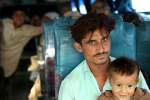- Text size
 |
|  |
|  |
| 
- Français
Namibian refugees, some in ambulances, repatriate from Botswana
News Stories, 21 November 2006

NGOMA, Namibia, November 21 (UNHCR) – A UNHCR-escorted convoy from Botswana has carried a group of Namibian refugees, including four in ambulances, back to their country and a homecoming where joy mingled with sadness.
The voluntary return by the 22 people was the second small repatriation of Namibians from Botswana this year, leaving behind about 1,100 of their countrymen who fled during a little-known secessionist struggle in Namibia's Caprivi Strip in the late 1990s. Most of the original 3,000 refugees returned soon after the conflict, but the small number repatriated last Saturday was a reminder of the reluctance of remaining refugees to return.
Those Namibians returning across a bridge from neighbouring Botswana included four children whose parents had died while in exile. The four men in the ambulances, who had been receiving care in their homes in Dukwi Refugee Camp, moved with difficulty and might be returning home to spend their final days in the company of friends and relatives.
Some other returnees, travelling in a bus escorted by vehicles of the Botswana police and the UN refugee agency, said they were going home to seek medical care. UNHCR does not ask a refugee why he wishes to repatriate, but refugees do not have access to anti-retroviral treatment for HIV/AIDS in Botswana – a country with one of the highest infection rates in southern Africa – while both citizens and refugees in Namibia are treated.
The 22 returnees set off at dawn from Dukwi, crossing the Chobe National Park, and were received by Namibian officials as they entered the Caprivi Strip, an extension of Namibia stretching to the Zambezi River that was created in the drawing of the 19th century colonial borders.
Namibian officials, anxious to consign the Caprivi struggle to their country's history and wanting remaining refugees to return, appealed for returnees to tell those left behind in Botswana that it is now safe to come home.
"One day it will come to an end," Phellem Chabolo, a refugee who returned from Dukwi, said on behalf of the returnees as relatives milled about. "Everyone will come home."
Although Namibians are the largest group in Dukwi, it is home to some 3,000 refugees from several African countries. Some 800 Angolans, refugees from the 25-year conflict in their country, form the second largest group and more than 500 Somalis who have fled the chaos in their homeland are the third largest.
Botswana has long hosted refugees at Dukwi. The camp, which has schools, a clinic and other facilities, was once the home to South Africans who fled apartheid and Zimbabweans fleeing the independence war in their country.

One Namibian who had been jailed for the past five years in Botswana on charges that he was a fighter in the independence movement and not a refugee was among those on the bus that headed home. The government cleared the return of Gallen Mousweu, who had always maintained his innocence, assuring UNHCR that there were no pending charges and he was free to resume his life.
"Even my brothers on that side [of the border] sent letters saying to come back. They say I did not commit any crimes, so – like these other Namibians – I should come home," he said in Dukwi, where he was brought by Botswanan prison authorities on the eve of the return.
Some of the Namibians still in Dukwi have not abandoned their hopes for an independent Caprivi Strip, remote as that possibility seems. "I am not going back without independence," said one refugee who arrived to see the departure of the returnees. "I am a refugee and I'll die a refugee."
The slow pace of repatriation among many refugees groups, including the Namibians, has prompted UNHCR to increase efforts to make them self-sufficient in the camp. This includes training to learn job skills, small-scale farming and the possibility of employment at a copper mine being developed near the camp.
But the formidable obstacles to integration into Botswanan society, and the continuing links to friends and family in Namibia, mean that repatriation continues to be under discussion. UNHCR has helped refugees to learn about conditions at home, sponsoring visits by Namibian officials who want them to return. And Namibians in the camp are in regular telephone contact with relatives at home.
"When I think about my family, my parents, it's time to go home," said Michael Kangongo, who arrived in Dukwi in January 1999 after what he said were problems with government soldiers suppressing the rebellion. He returned on Saturday with his wife and three children.
By Jack Redden in Ngoma, Namibia









































